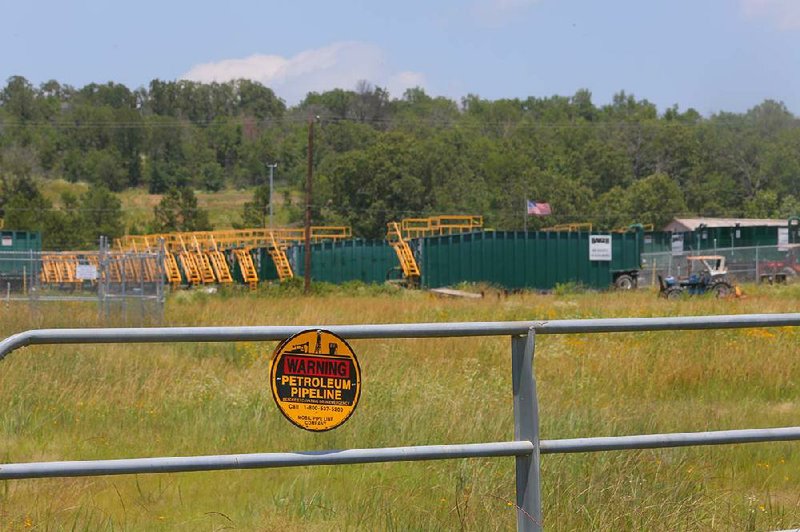The state and federal governments Thursday sued two subsidiaries of Exxon Mobil Corp. over a March 29 pipeline rupture that spilled more than 100,000 gallons of Canadian heavy crude oil into a Mayflower subdivision and nearby waterways, including part of Lake Conway.
The rupture between two houses in the Northwoods subdivision prompted the long-term evacuation of 22 homes, which Exxon Mobil has offered to buy at pre-spill appraisal prices. It also injured, displaced or killed hundreds of animals and led to the filing of several other lawsuits, including one on behalf of 64 Mayflower residents.
State Attorney General Dustin McDaniel - joined at a news conference Thursday by U.S. Attorney Christopher Thyer and Teresa Marks, director of the Arkansas Department of Environmental Quality - said state and federal investigations are continuing “and there are a number of outstanding issues that will be addressed.”

“However, this much is very clear,” McDaniel said. “The oil spill disrupted lives. This oil spill harmed the environment, and this oil spill was in violation of both state and federal law.
“This spill has caused a significant and lasting negative impact upon our state’s environment, and Exxon, as the responsible party for the incident, should be penalized for those impacts,” McDaniel said.
The attorney general’s office and the U.S. Department of Justice filed the federal lawsuit at the request of the Department of Environmental Quality and the U.S. Environmental Protection Agency.
Defendants are Exxon Mobil Pipeline Co., which operates the 850-mile-long Pegasus pipeline, and Mobil Pipe Line Co., which owns the more than 60-year-old pipeline that runs from Illinois to refineries along the Texas Gulf Coast. Exxon Mobil spokesman Aaron Stryk said the pipeline companies are subsidiaries of Exxon Mobil Corp.
The companies are accused of violating the Arkansas Water and Air Pollution Control Act, the Arkansas Hazardous Waste Management Act, the federal Oil Pollution Act and the federal Clean Water Act.
Stryk said Exxon Mobil is aware that the lawsuit has been filed, “but we’ve yet to review the allegations.”
“Obviously, we’re going to continue to cooperate” with state and federal agencies on the cleanup, he said.
McDaniel said Exxon Mobil also has been illegally storing petroleum, oily water and other oil-tainted debris from the cleanup on company-owned property along Arkansas 36 outside Conway. Exxon Mobil never got a permit to store the materials there, and despite being told in early May to move them, they remain, McDaniel said.
“To store this material without following the law in advance, and then to not remove it upon being demanded to do so, we felt was particularly concerning,” McDaniel said.
Marks said the issue with the storage is “not so much that it’s seeping or leaking” oil but that “this is not a place where they’re authorized to store” such materials, and if there were a tornado, for instance, problems could result.
Asked about the lack of a permit, Stryk said in an e-mail that Exxon Mobil’s attorneys had advised him that “until they have had an opportunity to fully review all of the allegations (including this one), I cannot comment any further.”
McDaniel would not discuss details of conversations with Exxon Mobil’s attorneys that preceded the decision to sue but said, “We have not found … them to view this the way” they should and the lawsuit was necessary.
The lawsuit also asks the companies to pay unspecified removal costs and damages.
In addition to civil penalties, McDaniel said, Exxon Mobil also “should foot the bill for the state’s cleanup costs.”
Marks said her office does not know how much the cleanup has already cost but that employees will be working to determine the amount.
Roughly 2 1/2 months after the spill, employees of Exxon Mobil, its contractors and government workers are still working on the cleanup, and Faulkner County Judge Allen Dodson said this week that he expects workers to remain in Mayflower at least a few more months.
In an e-mail interview, Stryk said, “As we have said repeatedly, we are paying for this cleanup and all associated expenses.”
Asked if Exxon Mobil had reimbursed government agencies yet and, if so, how much, Stryk said he could not provide totals reimbursed so far. He said, however, that some payments have been made.
Residents first noticed oil gushing from the underground pipeline on the afternoon of Good Friday. The thick, black oil flowed into yards, along North Starlite Road and then into a ditch, an unnamed creek, wetlands and a cove of Lake Conway before it was contained. Emergency workers quickly installed barriers that kept the oil from reaching the main portion of the popular fishing lake.
McDaniel said the cove is part of the lake and that maps do not distinguish it from the main portion of the lake on the opposite side of the road. The spill caused “and continues to cause pollution to waters of the State,” the lawsuit says.
“The petroleum that is still present in portions of the impacted area continues to negatively impact existing in stream water uses and does not meet the level of water quality necessary to protect the existing uses.”
Lake Conway - which, the lawsuit notes, flows into the Arkansas River - is not a source of drinking water.
The EPA said in a news release about the lawsuit that the oil “has contaminated land and waterways and impacted human health and welfare, wildlife, and habitat. … Many residents still have not been able to return home.”
McDaniel said none of the 22 evacuated homeowners has moved back.
The lawsuit also says the defendants “did not promptly repair damages to the Pegasus Pipeline.”
Workers removed a large segment of the damaged pipeline on April 15 and sent it to an independent laboratory for testing. On April 17, a new section of pipeline was installed. The pipeline has been shut down since the rupture.
Thyer said the lawsuit “is testament to at least two things.”
“First, both the United States and Arkansas have and will continue to take the rupture at Mayflower very seriously.” Second, he said, “We will use all available revenues to make sure Mayflower and Lake Conway are cleaned up and to make sure this doesn’t happen again here or elsewhere.”
Stryk said that on May 25, the laboratory provided a draft report of its findings to Exxon Mobil Pipeline Co. and to the Pipeline and the Hazardous Materials Safety Administration, a part of the U.S. Transportation Department.
“Upon review of the draft report, we determined that additional mechanical and metallurgical testing was warranted,” Stryk added. At Exxon Mobil’s request, the pipeline agency agreed to give the laboratory until July 10 to complete additional testing and submit a final report, which is to state what caused the rupture.
The pipeline agency has received the preliminary report, but neither the agency nor Exxon Mobil has commented on its contents.
Exxon Mobil recently downgraded its estimate on the amount of oil spilled from roughly 5,000 barrels, or 210,000 gallons, to about 3,500 barrels, or 147,000 gallons, but McDaniel declined to put an estimate on the size. One lawsuit has put the number of 42-gallon barrels at more than 10,000.
The number of barrels is significant because it is used in assessing civil penalties under the federal Clean Water Act, with the fine set at up to $1,100 per barrel unless “gross negligence” or “willful misconduct” took place. In the latter, the penalty can rise to $4,300 per barrel.
Thyer said he did not yet know what caused the pipeline to crack open and, therefore, did not know if there was negligence or misconduct.
“We don’t have those facts yet. We don’t know those facts,” Thyer said.
Arkansas law provides civil penalties of $10,000 per violation per day of the Water and Pollution Control Act and $25,000 per violation per day of the Hazardous Waste Management Act.
Regarding reimbursements for the cleanup, Stryk said, the company expects that the state, along with federal natural resource trustees, will conduct a natural resource damage assessment and enter into a reimbursement agreement.
“Valid and reasonable incident response costs incurred by the state of Arkansas will be reimbursed through the existing process that is overseen by the Unified Command and are subject to the review of the EPA,” Stryk added.
“Those costs will eventually be billed to Exxon Mobil Pipeline Company. Valid and reasonable costs or other expenses that fall outside of any [natural resource damage] assessment and the Unified Command process will be reimbursed through Exxon Mobil’s existing claims process. The Town of Mayflower, Faulkner County and other Arkansas governmental entities have already submitted claims for reimbursement through this process and those claims have been processed and paid.”
Front Section, Pages 1 on 06/14/2013


